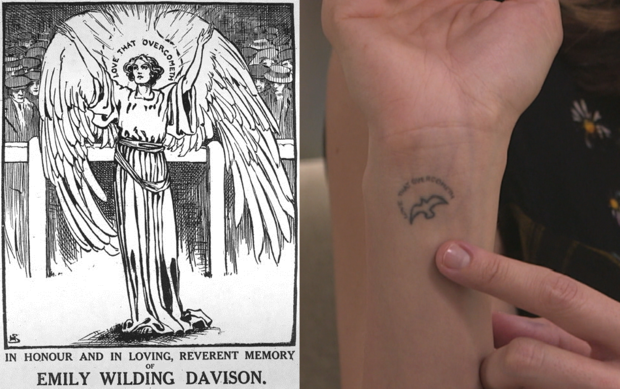Carey Mulligan dishes on new movie, "Suffragette"
History goes down differently on the set of "Suffragette," a new film about women's fight for voting rights in Britain in the early 20th century, starring 30-year-old Oscar-nominee Carey Mulligan.
"Suffragette" sheds light on a gritty and little-known part of history, reports "CBS This Morning" co-host Norah O'Donnell. Before the film, Mulligan said, she knew little about the suffragettes.
"I knew a sort of really basic school version which is a little paragraph in our history book saying, you know, 'Women got the vote eventually,"' Mulligan said, laughing. "Somehow. It was a couple of lines and, you know, lots of images of women with flowers looking very peaceful."
But the film also creates some of its own history, with a nearly all-female cast and crew -- including its writer, producers and director.
"Completely unique. We also had a costume designer, makeup designer, [and] set designer [who] were all women. I've never been a part of anything like that before," Mulligan said. "You know, we were a group of women who were very, very excited to be telling the story."
Mulligan, who is best-known for her role as Daisy Buchanan in "The Great Gatsby" and received an Oscar nod for her role in "An Education," now plays the fictional Maud Watts, a young laundry worker, wife and mother whose daily life is dismal before she's radicalized to fight for women's suffrage in 1912. She does it despite a series of tragedies in her impoverished life, including losing her husband and son, and her job, and being jailed multiple times.
"It's such a hard thing because ... I've been lucky enough to grow up ... in a life when I haven't had to fight for anything," Mulligan replied when asked if she would display the same courage as her character had. "The point of our film sort of says if you can't throw a rock for yourself, maybe you'd throw one for somebody else."
But the film is not about a peaceful protest for the women's right to vote: The suffragettes are militants.
Meryl Streep plays Emmeline Pankhurst, real-life leader of the militant suffrage movement, who called for the use of violent tactics like arson and vandalism.
Mulligan defended the women, describing their prolonged denial of the right to vote, despite the "50 years of very peaceful campaigning, which was rejected and pushed away and swept under the carpet."
When O'Donnell asked if the women could be considered "terrorists" due to their drastic violent measures, even setting off bombs, Mulligan said they were not terrorists "in a modern day sense."
"Because they were clear and Emmeline Pankhurst was very clear that no human life should ever be in danger," said Mulligan. "They only ever risked their own lives."
The movie also details the harassment and brutalities the suffragettes faced, including sexism, police brutality, force feeding, losing their jobs and being jailed multiple times.
Mulligan said it was important to show everything because of the "sort of sanitized version of our history" up until now.
"I left school and I voted because my parents voted. But I didn't really understand the weight of what I had with my vote," she said.
The film has already sparked a strong reaction at its U.K. premiere. Protesters against cuts to domestic violence services lay down on the red carpet, which Mulligan welcomed.
"Yeah, we felt kind of excited by that," she said. "I think, you know, again, being part of a film that sparks debate and has people talking and inspires people to stand up and do something, is great."
Mulligan also revealed that the film was personal, saying that, for the first time, she felt "really proud to be a woman."
"I kind of grew up with a brother. I was always a tomboy when I was a kid," she said. "But I was surrounded by these really, really great, strong, intelligent, thoughtful women and making this film that we all felt was so important. And I felt really proud of that and really proud to be a woman and really proud to be a feminist."
Inspired by her experience making the movie, Mulligan got a new tattoo - a tribute to Emily Davison, one of the first martyrs of the movement, who was killed when she threw herself in front of the king's horse during Derby Day in 1913. The tattoo says "Love that overcometh," words that were written above an illustration of Davison on the front cover of The Suffragette, a weekly magazine the suffragettes published after Davison died.
"I had a feeling with "Suffragette" that it was a job that was going to stay with me forever - that it wasn't just a job," Mulligan said. "I think it's going to be something that will stand out as something really important to me for a long, long time."
